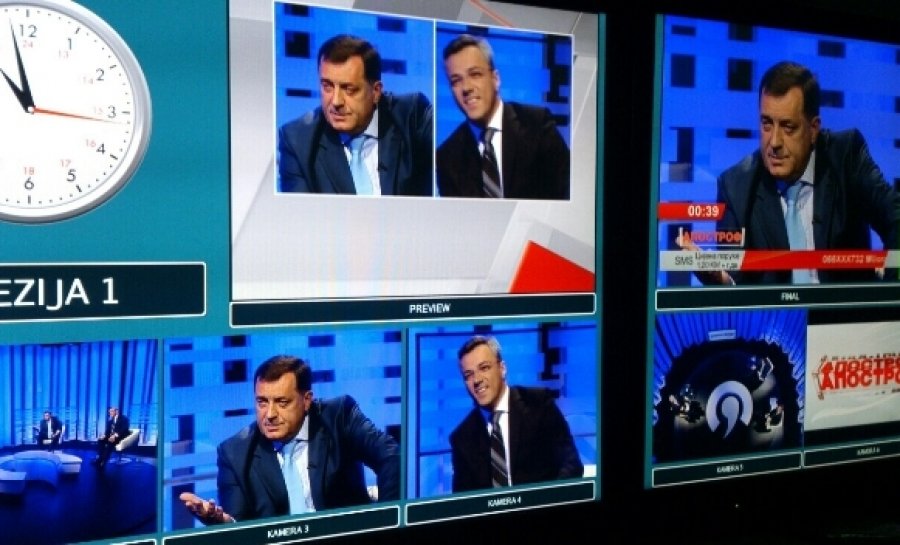
As Bosnia’s general elections draw closer, Milorad Milojević investigates the problems that continue to plague the country’s democratic processes.
After the TV debate between the two opposing candidates for the presidency of the Bosnian entity of Republika Srpska, the leader of SNSD, Milorad Dodik, and Ognjen Tadic, the vice president of SDS — the strongest party in the oppositional Alliance for Change — I read a good comment from one of the viewers, which I will quote here: “This debate was more for the illiterate than for the indecisive among the voters.” And that iss exactly how it was, since it resembled two idlers arguing about a fence dispute on some farm. Without even mentioning the less rational attempts at dialogue, one cannot help but mention how Tadic spoke to Dodik in an extremely personal manner, and even interrupted him by saying: “It’s okay Bajo. It’s over. Enough!” Dodik mostly tried to ignore Tadic, but also insulted his opponent in moments of nervousness. The debates of other candidates in Bosnia-Herzegovina do not differ much from this one much. They are light years away from elegantly elaborating opposing attitudes, which can be seen in debates among candidates running for leading positions in the US, France or Germany.
In fact, most politicians in Bosnia haven’t offered any realistic or coherent story to their voters in this election campaign. Instead, they predominantly focused on collecting points through accusing their opponents of crime, corruption, the poor economy or engaging in fierce nationalist rhetoric.
It is ironic how some social democrat parties like Dodik’s SNSD turned completely to nationalism during the primaries. During a rally in Petrovo, Dodik proclaimed: “You need to remember how important these elections are for your safety. If you make the wrong choice, in a year all that will be left of Republika Srpska will be its name.” He even went as far as to give an interview to the Zagreb-based Jutarnji List, announcing that he would support the formation of a third federal unit in Bosnia, made up of a Croat majority and all the elements of a statehood; and, in the long run, he would offer to create an alliance in order to make three states out of Bosnia.
The HDZ leader and candidate for the Croat member of the Bosnia Presidency Dragan Covic has, at the same time, ‘reminded’ us of the Croats’ demands in Bosnia regarding the federalization of the country, the introduction of a public broadcasting service channel in Croatian language, etc…
On the other hand, electronic media were flooded with photos of the former head of the Islamic Community in Bosnia, Mustafa Ceric, addressing potential voters in Jajce under the bust of the late president of the former Yugoslavia Josip Broz Tito. For those familiar with the life and work of Mustafa Ceric, it was a shock:
Many will say that I constantly shock people, so here’s another shock. As the former head of the Islamic Community, it is probably hard for many of you to imagine me standing under Tito’s bust, and speaking from the same podium from which he spoke. There were some good things in former Yugoslavia, and it bothers me that some people monopolize Tito now and use him for their own interests, and, considering the things they are doing, they shouldn’t mention Tito or anti-fascism at all. Tito was one thing… and they are something else completely.
Politicians have also succeeded in shocking citizens during this election campaign, who are once again paying out of their own pockets for this circus. And we are not only talking about the money allocated to parties from the budget. Party members have taken advantage of other sources of financing as well. Transparency International Bosnia-Herzegovina (TI BiH) calculated that parties withdrew 24 million BAM (12 million Euros) from various levels of government. Their research included political advertising, election rallies, budget allocations and the use of public resources for campaign promotion.
“24 million BAM equals approximately 71,428 pensions — i.e. 6,000 retirees could have received their monthly checks for a year from that amount of money,” said public relations manager for TI BiH Ivana Korajlic, effectively illustrating how much money is wasted by those trying to buy the voters’ trust.
Korajlic also added that TI BiH is still collecting data on the abuse of public resources for political campaigning, such as the use of official vehicles and public enterprises, as well as taking official per diems for travel to campaign rallies. For example, TI BiH demanded data from the Helicopter Service of Republika Srpska regarding the use of helicopters in the transport of SNDS officials in the entity. It has also been stated that Autoceste’s construction of Corridor 5c was used for the promotion of SDP Bosnia and thus represents an abuse of a public enterprise and public resources for the election campaign.
For a country with over half a million unemployed persons, the same number of retirees, and where every other young person wants to go abroad in search of a better future, it is clear how the recklessness of Bosnia’s political structures results in insensitivity towards the social sectors. Not one of the political parties has forfeited their piece of the financial pie to benefit those they allegedly represent.
In light of all this, one should also look at the behavior of the media, who, together with rallies and election posters, are the main transmitters of political ideas. Of course, there are media who have professionally dealt with the election campaign and what it entails. But, it is also obvious that the verbal offenses of different political candidates were carried through the media outlets. The Institute for Social Research at the Faculty of Political Science in Banja Luka has conducted a study that shows that as many as 75% of citizens are convinced that media are under the influence of advertisers or political parties.
And finally, will the deceased be voting in these elections? I am not only talking about the victims of the last war, although they are mentioned quite often by all the political candidates, but also about those who died to preserve Bosnia as well as those who died to protect one of the national identities in this divided country.
The deceased are, however, still on the voters’ list. A citizen, Brankica Sudar, has filed a complaint with the Central Election Committee of Bosnia (CIK Bosnia) after she saw her late father’s name on the list of voters, even though he died back in 2007. There is no official data on how many deceased citizens are still on the list of voters, but it is interesting that this problem is recurrent and visible in almost all elections. CIK Bosnia shifts the blame to the Agency for Identification Documents, Registers and Data Exchange (IDDEEA). Taking into account that IDDEEA has spent 104 million BAM to establish a brand new system for issuing personal documents, where everything is electronically connected, including all the registry offices, how is it even possible that no one has compared these files to the list of voters in order to remove the names of the deceased? These facts surely cast doubt on the reliability and independence of the electoral process.
On October 12, citizens will choose from 7,877 candidates who are competing for 518 seats across three levels of government. The current situation in Bosnia says enough about how many times we have been fooled, not since the war, but since the first democratic elections in 1990. There are even some people who have been in office since those first elections, and they continue to hold office by pulling the wool over people’s eyes. But maybe it is not up to them. Perhaps Orwell was right when he said: “A people that elect corrupt politicians, imposters, thieves and traitors are not victims… but accomplices.”






